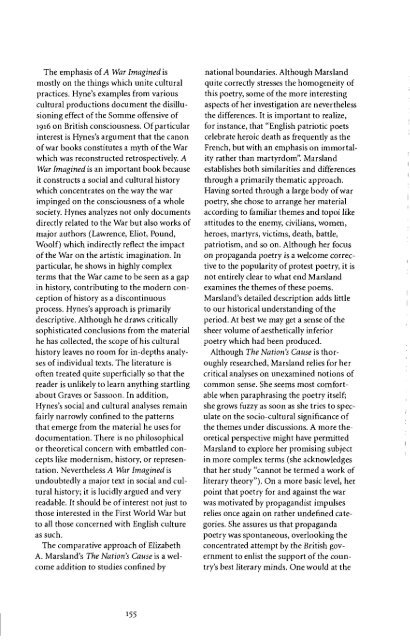The Carpathians - University of British Columbia
The Carpathians - University of British Columbia
The Carpathians - University of British Columbia
You also want an ePaper? Increase the reach of your titles
YUMPU automatically turns print PDFs into web optimized ePapers that Google loves.
<strong>The</strong> emphasis <strong>of</strong> A War Imagined is<br />
mostly on the things which unite cultural<br />
practices. Hyne's examples from various<br />
cultural productions document the disillusioning<br />
effect <strong>of</strong> the Somme <strong>of</strong>fensive <strong>of</strong><br />
1916 on <strong>British</strong> consciousness. Of particular<br />
interest is Hynes's argument that the canon<br />
<strong>of</strong> war books constitutes a myth <strong>of</strong> the War<br />
which was reconstructed retrospectively. A<br />
War Imagined is an important book because<br />
it constructs a social and cultural history<br />
which concentrates on the way the war<br />
impinged on the consciousness <strong>of</strong> a whole<br />
society. Hynes analyzes not only documents<br />
directly related to the War but also works <strong>of</strong><br />
major authors (Lawrence, Eliot, Pound,<br />
Woolf) which indirectly reflect the impact<br />
<strong>of</strong> the War on the artistic imagination. In<br />
particular, he shows in highly complex<br />
terms that the War came to be seen as a gap<br />
in history, contributing to the modern conception<br />
<strong>of</strong> history as a discontinuous<br />
process. Hynes's approach is primarily<br />
descriptive. Although he draws critically<br />
sophisticated conclusions from the material<br />
he has collected, the scope <strong>of</strong> his cultural<br />
history leaves no room for in-depths analyses<br />
<strong>of</strong> individual texts. <strong>The</strong> literature is<br />
<strong>of</strong>ten treated quite superficially so that the<br />
reader is unlikely to learn anything startling<br />
about Graves or Sassoon. In addition,<br />
Hynes's social and cultural analyses remain<br />
fairly narrowly confined to the patterns<br />
that emerge from the material he uses for<br />
documentation. <strong>The</strong>re is no philosophical<br />
or theoretical concern with embattled concepts<br />
like modernism, history, or representation.<br />
Nevertheless A War Imagined is<br />
undoubtedly a major text in social and cultural<br />
history; it is lucidly argued and very<br />
readable. It should be <strong>of</strong> interest not just to<br />
those interested in the First World War but<br />
to all those concerned with English culture<br />
as such.<br />
<strong>The</strong> comparative approach <strong>of</strong> Elizabeth<br />
A. Marsland's <strong>The</strong> Nation's Cause is a welcome<br />
addition to studies confined by<br />
national boundaries. Although Marsland<br />
quite correctly stresses the homogeneity <strong>of</strong><br />
this poetry, some <strong>of</strong> the more interesting<br />
aspects <strong>of</strong> her investigation are nevertheless<br />
the differences. It is important to realize,<br />
for instance, that "English patriotic poets<br />
celebrate heroic death as frequently as the<br />
French, but with an emphasis on immortality<br />
rather than martyrdom". Marsland<br />
establishes both similarities and differences<br />
through a primarily thematic approach.<br />
Having sorted through a large body <strong>of</strong> war<br />
poetry, she chose to arrange her material<br />
according to familiar themes and topoi like<br />
attitudes to the enemy, civilians, women,<br />
heroes, martyrs, victims, death, battle,<br />
patriotism, and so on. Although her focus<br />
on propaganda poetry is a welcome corrective<br />
to the popularity <strong>of</strong> protest poetry, it is<br />
not entirely clear to what end Marsland<br />
examines the themes <strong>of</strong> these poems.<br />
Marsland's detailed description adds little<br />
to our historical understanding <strong>of</strong> the<br />
period. At best we may get a sense <strong>of</strong> the<br />
sheer volume <strong>of</strong> aesthetically inferior<br />
poetry which had been produced.<br />
Although <strong>The</strong> Nation's Cause is thoroughly<br />
researched, Marsland relies for her<br />
critical analyses on unexamined notions <strong>of</strong><br />
common sense. She seems most comfortable<br />
when paraphrasing the poetry itself;<br />
she grows fuzzy as soon as she tries to speculate<br />
on the socio-cultural significance <strong>of</strong><br />
the themes under discussions. A more theoretical<br />
perspective might have permitted<br />
Marsland to explore her promising subject<br />
in more complex terms (she acknowledges<br />
that her study "cannot be termed a work <strong>of</strong><br />
literary theory"). On a more basic level, her<br />
point that poetry for and against the war<br />
was motivated by propagandist impulses<br />
relies once again on rather undefined categories.<br />
She assures us that propaganda<br />
poetry was spontaneous, overlooking the<br />
concentrated attempt by the <strong>British</strong> government<br />
to enlist the support <strong>of</strong> the country's<br />
best literary minds. One would at the

















